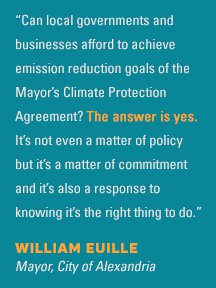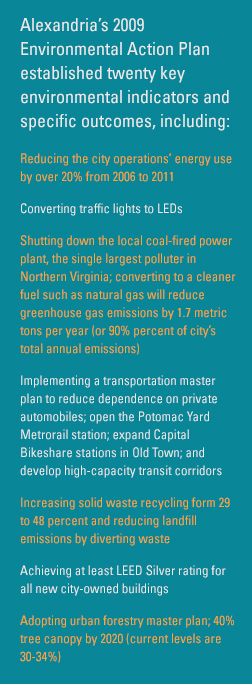As frustrating as Congress’ unwillingness to take serious action to reduce greenhouse gas emissions may be additional legislation may not even be necessary to achieve the country’s climate mitigation goals.
That was one of the key points stressed during a recent panel discussion with climate experts from the Georgetown Climate Center Brookings and local elected officials at the Council of Governments.
The idea presented wasn’t that Congress gets a pass for its inaction on the issue rather that innovative measures taken at the state and local level combined with the use of existing federal authority can get the U.S. to its short-term goal of a 17% reduction in emissions by 2020.
District of Columbia Councilmember Mary Cheh summed up the spirit of the discussion well: “The federal government isn’t leading the way we [local communities] are. And obviously we all want to push in the same direction but it’s so vital that we continue this on the local level because we can measure it we can manage it and we can implement plans.”
Vicki Arroyo Executive Director of the Georgetown Climate Center noted that as the impacts of climate change become more frequently and more painfully evident – in the form of “superstorm” Sandy or widespread droughts affecting half of America’s counties – state and local governments aren’t waiting around for Congress to act on the issue.
Arroyo highlighted several initiatives underway at the state and regional level to fight climate change such as the Regional Greenhouse Gas Initiative (RGGI) in the Northeast and Mid-Atlantic (including Maryland) California’s recently launched state-level cap and trade program and PACE (Property Assessed Clean Energy) financing programs available in several states that encourage renewable energy and energy efficiency by homes and businesses.
Arroyo concluded by reiterating that Congressional action is not needed to dramatically reduce emissions if state and localities continue to innovate. More action at the federal level would certainly be desirable but partisan gridlock on the Hill shouldn’t prevent other levels of government from progressing on the issue.
Alexandria Mayor and COG Board Vice Chairman Bill Euille agreed arguing that even though municipal governments are experiencing financial challenges failing to act now will only prolong the agony increase the costs and ensure that we never reach our goals. The ecological and economic reality makes the case for acting now.
Mayor and COG Board Vice Chairman Bill Euille agreed arguing that even though municipal governments are experiencing financial challenges failing to act now will only prolong the agony increase the costs and ensure that we never reach our goals. The ecological and economic reality makes the case for acting now.
Euille discussed local initiatives in greater detail beginning with the U.S. Conference of Mayors’ Climate Protection Agreement. The Agreement is a multi-year grassroots campaign to meet or exceed Kyoto Protocol goals by reducing carbon emissions in city operations and communities.
Established in 2005 the Agreement has been signed by Euille then-DC Mayor Adrian Fenty 25 other mayors in Maryland and Virginia and more than 1000 mayors across the U.S. representing nearly a third of the country’s population.
The Mayors’ Agreement doesn’t prescribe specific actions but promotes policies in a number of areas – ranging from conducting a greenhouse gas inventory and setting reduction targets to promoting fleet efficiency and increased transportation alternatives – and encourages communities to decide what best works for them.
Euille then transitioned to focus on specific actions his city has implemented to reduce its carbon footprint.
Alexandria established the EcoCity charter in 2008 making the city a place where people can live healthier and economically productive lives while reducing environmental impact. The Charter was followed by the 2009 Alexandria Environmental Action Plan which recommended 353 actions to achieve this goal. The effort is a partnership between the city its citizens the environmental policy commission and Virginia Tech’s Alexandria campus.
Euille noted that Alexandria and other cities are facing the climate challenge at the same time that budgetary restraints are putting more and more pressure on local programs. The key he argued is to integrate environmental planning into existing plans and projects. In other words make environmental considerations an integral part of the decision-making process not an afterthought.
Header image: Alexandria City Hall (from Wikipedia)
This post is part of The Yardstick’s second annual Earth Month blog series. During the month of April we will highlight news and events related to the environment climate change and energy.
